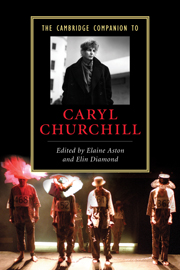Book contents
- Frontmatter
- 1 Introduction: on Caryl Churchill
- 2 On feminist and sexual politics
- 3 On owning and owing: Caryl Churchill and the nightmare of capital
- 4 On the challenge of revolution
- 5 On text and dance: new questions and new forms
- 6 On Caryl Churchill’s ecological drama: right to poison the wasps?
- 7 On performance and selfhood in Caryl Churchill
- 8 On Churchill and terror
- 9 On collaboration: ‘not ordinary, not safe’
- 10 On Churchill’s influences
- Select bibliography
- Index
7 - On performance and selfhood in Caryl Churchill
Published online by Cambridge University Press: 28 March 2010
- Frontmatter
- 1 Introduction: on Caryl Churchill
- 2 On feminist and sexual politics
- 3 On owning and owing: Caryl Churchill and the nightmare of capital
- 4 On the challenge of revolution
- 5 On text and dance: new questions and new forms
- 6 On Caryl Churchill’s ecological drama: right to poison the wasps?
- 7 On performance and selfhood in Caryl Churchill
- 8 On Churchill and terror
- 9 On collaboration: ‘not ordinary, not safe’
- 10 On Churchill’s influences
- Select bibliography
- Index
Summary
“Theatre is born in its own disappearance, and the offspring of this movement has a name: man.” Jacques Derrida / In 'The Work of Art in an Age of Mechanical Reproduction', Walter Benjamin argued that technologies of mass reproduction had undermined the work of art's 'originality', rendering ideas of its 'authenticity' and its 'authority' increasingly irrelevant, however nostalgically they might be mourned. These ideas concatenate in Caryl Churchill's play A Number, whose Bernard worries about human identity under threat from cloning technology. Having met his genetic double - one, he learns, of a number - Bernard frets that 'someone else is the one, the first one, the real one', neatly tying together essence, origins and authenticity. Salter answers, 'no because . . . I'm your father'. He guarantees Bernard's uniqueness with a sui generis paternal authority, merely by reiterating the son's patrilineage. But unsurprisingly Salter's balms turn out to sting rather than soothe. Of course, all of the clones are genetically descended from him; in fact, Bernard is not 'the first one'; and, in time, Salter's paternal succour will fail even the first one, also Bernard, who turns up in the play's second scene and who eventually ends his own existential conflict in suicide.
- Type
- Chapter
- Information
- The Cambridge Companion to Caryl Churchill , pp. 105 - 124Publisher: Cambridge University PressPrint publication year: 2009
- 3
- Cited by

